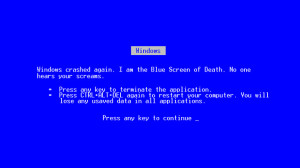 We live in a society that largely looks at those who fail as, to quote a certain Presidential candidate, “Losers.” And, no one wants to be a loser. Often the tighter our budgets, the less likely we are to try new things for fear of failing. The only way to never fail, as the saying goes, is to not try at all.
We live in a society that largely looks at those who fail as, to quote a certain Presidential candidate, “Losers.” And, no one wants to be a loser. Often the tighter our budgets, the less likely we are to try new things for fear of failing. The only way to never fail, as the saying goes, is to not try at all.
All of this stands in contrast with the platitude-laden conference panels, posts and conversations about failure. They say that is is ok to fail. That failure is part of the learning process. That it is but one step in the innovation process. That every failure leads to success. That failure is the best teacher.
Those are really great inspirational messages. I feel much better. Woohoo, failure!
The problem is that the platitudes are disingenuous… as platitudes often are. We talk about the positive consequences of failure as though they are naturally occurring, like your idea blows up in your face and you are suddenly imbued with insight and a blueprint for future success. It just doesn’t happen that way.
You actually have to work extra hard to fail correctly.
If at first you don’t succeed, call it an “experiment.”
People often try to rebrand their failure as an “experiment,” which is great. That’s exactly the framing we should use but it cannot be applied after the fact. We have to set it up from the outset as an experiment. What is your hypothesis? What do you hope to learn? How will you measure success? That is how you learn from your mistakes.
Throw your own postmortem.
We are busy people – busy, largely under-resourced people. When we fall down we can’t afford to just lie there clutching our freshly-skinned knees. We’ve got things to do, right? We’ve got to get to our feet and hobble off to the next thing, thinking we’ll figure out what went wrong later. But, the longer we wait the less we remember… and the longer we operate without the benefit of that new knowledge. We have to make the time to debrief, talk to the team, look the data, figure out why our hypotheses were wrong and what we will do differently next time. And most importantly, document and share this information.
It’s the culture, stupid.
Unfortunately, we all live and operate in the real world. We have funders, audiences, bosses who might not have gotten on board the celebrate-every-failure train. Plus, admitting failure requires a degree of vulnerability, which is not always seen as a positive trait. We have to assess our culture’s tolerance for risk. Even within the most risk-averse cultures, though, there are paths you can navigate. And, it often comes down to scale and forewarning. Set expectations. Start small. Be clear about what you will learn from that small investment. Talk over the risks and rewards with your boss. You never want to surprise your boss. It rarely works out in your favor.
For the next several days we want to keep this conversation going, and we want to hear from you. Failure is the one topic with which we all have extensive experience but it is one that we are often unlikely to discuss. Let’s change that. I’ll start:
Hello, Reader. My name is Dallas and I have failed. This post was originally supposed to be posted a week ago.
Ok, now you go…

Leave a Reply